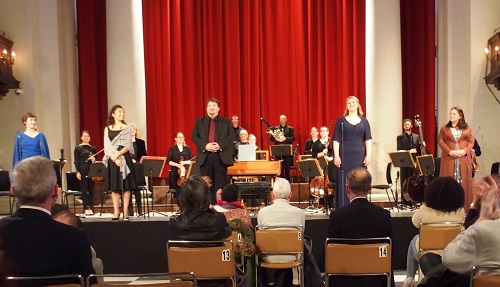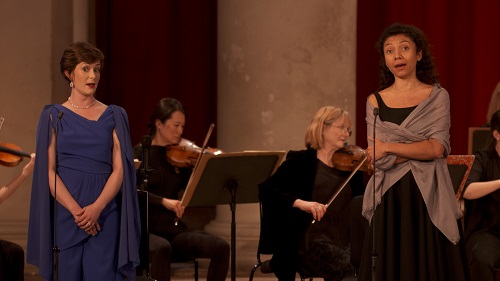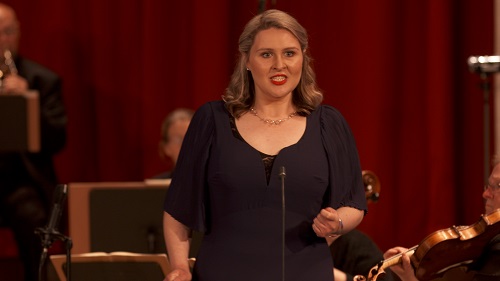It’s a brave company that celebrates the return of live performance with an opera titled La corona, but ambitious, innovative and imaginative describe Bampton Classical Opera perfectly, and it was no surprise that there was a socially distanced ‘full-house’ audience at St John’s Smith Square, eager to hear a concert performance of Gluck’s 1965 one-act azione teatrale, ‘The Crown’.
La corona is not the work of ‘Gluck the Reformer’. The 80-minute sequence of alternating secco recitatives and florid da capo arias was devised to showcase the talents of the four Hapsburg archduchesses – Maria Elisabeth, Maria Amalia, Maria Josepha and Maria Carolina – who had taken the solo roles in Gluck’s festa teatrale, Il parnaso confuso,during the wedding festivities of the future Emperor Joseph II and Princess Maria Josepha of Bavaria in January 1765. It must have served its purpose for so delighted was Empress Maria Theresa with that nuptial entertainment, that she commissioned La corona to celebrate her husband’s birthday on 4th October that year.

The scheduled premiere never took place: that summer Emperor Francis I died suddenly in his carriage when returning from the opera at Innsbruck, and Gluck put the score back in the drawer. It was not performed during his lifetime. A 1966 broadcast by the Austrian Broadcasting Company was the first time the score was heard, and it was not until the bicentenary of Gluck’s death in 1987 that a staged performance was mounted – in the intimate Salon de Bataille at the Schōnbrunn Palace in Vienna, the original planned venue.
To honour the Emperor, a hunting enthusiastic, Metastasio chose for his libretto plot the Calydonian boar hunt, sweetening the unusually violent subject matter with a dash of romantic sentimentality and characteristic light humour. Affronted by King Oeneus’s meagre sacrificial offerings, Diana, the goddess of hunting, has sent the boar to ravage the region of Calydon. The king’s son, Meleagro, insists that stalking the beast is princely work, but Atalanta, a devotee of Diana and proto-feminist, insists that she should have the right to deliver the neighbourhood. Her friend, Asteria, wants a part of the action too, and they dash into the wood, leaving Atalanta’s sister, Climene, anxiously fearing for the safety of the would-be boar-slayers while wishing she could join in the exploits. When they emerge from the forest, Meleagro declares Atalanta the victorious huntress, but they engage in a coy ‘After you, Alphonse’ routine before all decide that it is the loving Emperor Francis who is truly deserving of Diana’s laurel crown.

Judging by the decorative virtuosity of Gluck’s arias, the talents of the four princesses must have been considerable, but the elaborate writing did not trouble the fresh-voiced quartet at St John’s who relished both the vocal challenges and the delightful musical characterisation. French-Canadian soprano Samantha Louis-Jean was a feisty Atalanta, demonstrating agility in the fiendish fioratura, particularly so when shoring up her courage in her second aria, ‘Quel chiaro rio che a pena’. Metastasio’s simile – a limpid brook will become a mighty river, when confronting the ocean – offers Gluck the opportunity to contrast pastoral lyricism with dazzling outbursts, and Louis-Jean was accomplished in both.
As the heroic Meleagro, soprano Harriet Eyley combined warmth and litheness. She captured the prince’s earnestness in ‘Sol voi rese il ciel cortese’, praising the Emperor’s glorious virtue, while ‘Fe’ germolgliare il fato’ was an absolute delight, her finely shaped Gluckian phrases enhanced by Emma Feilding’s terrific oboe obbligato and the sensitive string accompaniment. The rival boar-slayers squabbled sweetly in their closing duet, their light voices crisply negotiating Gluck’s curlicues. Lucy Anderson’s soprano displayed a lovely shine as Asteria savoured the sparks of bravery glowing in her breast, egged on by nimble hunting horns. Climene’s aria finds Gluck at his most poised and noble, and Lisa Howarth’s attractive soprano captured the young girl’s sincerity.

Bampton wisely replaced the lengthy secco recitatives with an English narration to link the arias, and Rosa French was an engaging story-teller – impressively un-scripted – guiding the audience through the hunters’ adventures with genial charm and well-judged irony.
From the harpsichord, Robert Howarth led the fourteen-strong CHROMA in a polished performance which made the most of Gluck’s diverse characterisation. If the necessarily reduced numbers did mean that the strings occasionally lacked weight, the playing was unfailingly stylish and elegant, and the tempi well-judged.
Later this summer, Bampton Classical Opera will perform Gluck’s Paride ed Elena, the love duet of which draws material from the central Lento of the overture of La corona. It seems a surprise that Gluck did not plunder the score of his abandoned opera more frequently in subsequent works. For, La corona is a lovely opera and, at St John’s, Bampton Classical Opera did it proud.
Claire Seymour
Atalanta – Samantha Louis-Jean, Meleagro – Harriet Eyley, Climene – Lisa Howarth, Asteria – Lucy Anderson, Narrator – Rosa French, Conductor – Robert Howarth, CHROMA.
St John’s Smith Square, London; Tuesday 18th May 2021.
ABOVE: Peter Paul Rubens, ‘The Calydonian Boar Hunt’ (c.1612)